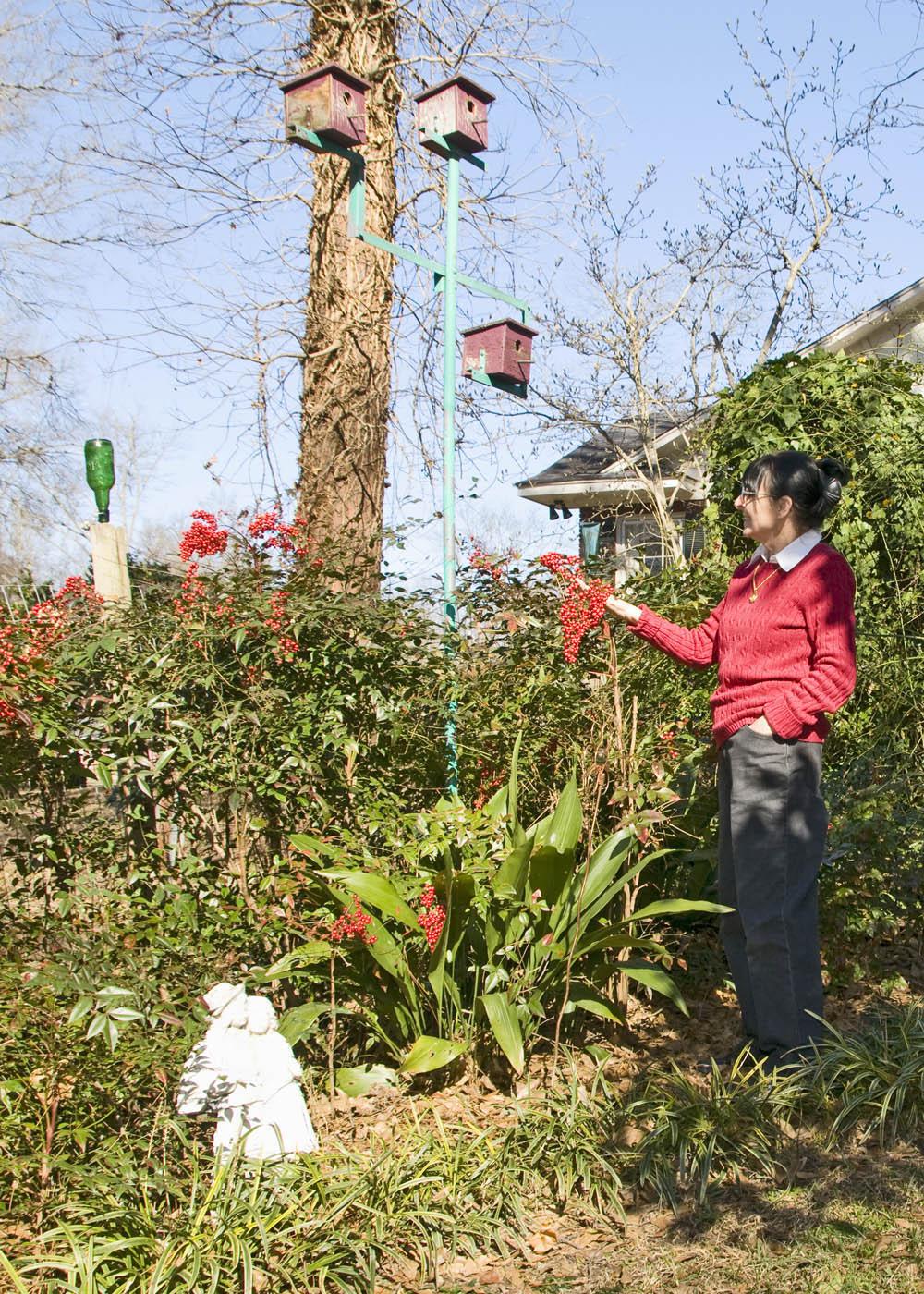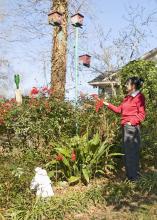Information Possibly Outdated
The information presented on this page was originally released on February 5, 2009. It may not be outdated, but please search our site for more current information. If you plan to quote or reference this information in a publication, please check with the Extension specialist or author before proceeding.
Master Gardeners beautify communities
MISSISSIPPI STATE -- Volunteers who have earned the title of Master Gardener share a love for gardening and a desire to serve others, but the projects they take on are as varied and unique as the individuals themselves.
Mississippi has more than 750 active Master Gardeners, a group of people who have completed 40 hours of college-level training in horticulture and volunteered a required number of hours.
Lelia Kelly is a consumer horticulture specialist with the Mississippi State University Extension Service and the statewide Master Gardener coordinator. She said the work of these volunteers is almost immeasurable.
“These are people who don't get into the program unless they have a real spirit of volunteerism where they're willing to give back to their communities,” Kelly said. “They find out what the horticulture need is in an area and work very efficiently to fill that need. They do so many worthwhile projects in our communities.”
Kelly said volunteers must complete 40 hours of training at a cost of $85 and perform 40 hours of volunteer service the first year to be certified as Master Gardeners. To maintain their status, Master Gardeners annually must take 12 hours of educational classes and perform at least 20 hours of service.
“Master Gardeners serve under the guidance and supervision of the county Extension director or area horticulture agent,” Kelly said. “They have the same charge as Extension Service employees, to deliver good, research-based information to the public to improve their quality of life and, in this case, make them better gardeners.”
Master Gardeners commonly beautify and maintain landscaping in public areas near courthouses, other buildings and downtown boulevards. Others routinely do projects at schools and with students, help with landscape recovery efforts after disasters, and work as volunteers at garden shows and horticulture events.
Silvana Rausa is a long-time Leflore County resident and Master Gardener. The native of Italy came to the Delta for the first time in 1966 as the wife of a doctor serving with the U.S. Public Health Service.
“I took the first Master Gardener course they ever offered in Leflore County,” Rausa said. “They did it right, and it was a pleasure to do it.”
Rausa's interest in horticulture has been life-long. She began living in the Italian countryside with her family when she was 6. The family grew their own vegetables and raised chickens and rabbits. Later she became the first female graduate of an agriculture school in Italy. When Rausa came to the United States, she and her husband first lived in New York City and then in a 20-story apartment building in Newark, N.J.
When the couple moved to the Delta, Rausa finally had a chance to have a garden of her own. But she does more than work in her garden. Rausa became a Master Gardener in 1995. Her projects are numerous and include installing and maintaining landscaping at the Leflore County Extension Office, landscaping the Leflore County Courthouse and organizing plant swaps.
“At the end of the day, it's nice to know you did something and were happy,” Rausa said of her work with the Master Gardeners.
Shirley Estes, a Brookhaven city official and dedicated Master Gardener, shares Rausa's enthusiasm for the volunteer work.
“I am very interested in gardening and have been active in community appearance for quite a few years,” Estes said. “I saw the Master Gardener program as a wonderful opportunity to do this in an organized and concentrated fashion.”
Estes became a Master Gardener in 2000 and an alderman in 2004. She is on the Chamber of Commerce community appearance group and is a trustee for the Brookhaven Beautiful organization. She often finds these duties intertwined.
“Every time a new project comes up, the mayor asks me, ‘Do you think you can handle that?'” she said. “Sometimes I'm wearing not just one of those hats but all of them at once.”
Lincoln County projects include landscaping at the hospital, library, fire department and cemetery, as well as tending a rose bed and large planters in downtown Brookhaven. Planned projects include landscaping at the county's fairly new Confederate memorial and the police department's new location.
“The thing that makes the Master Gardener program successful is that we can network with all these other programs, but the professionalism comes from the training we get and the resources we have through Mississippi State University and the Extension Service,” Estes said.
Jon Ruscoe is the Lafayette County Extension director who oversees an active group of 36 Master Gardeners. The group has not been around long, but they are hard-working.
“You can't beat them,” Ruscoe said of their dedication.
A few years ago, the group began offering a learning series each spring that was free and open to the public. The series usually runs for about five weeks, covering different topics each time.
“People bring a bagged lunch and listen to a Master Gardener talk about gardening topics,” Ruscoe said. “The seminar series covers anything from invasive species to ornaments in the landscape. It has been very successful.”
Lafayette County is not the only county that offers such an opportunity.
Kelly said the Extension Service usually trains between 150 and 200 new volunteers each year, and usually at least half complete their commitment to become certified Master Gardeners. For more information on the program, contact the local county Extension office.




